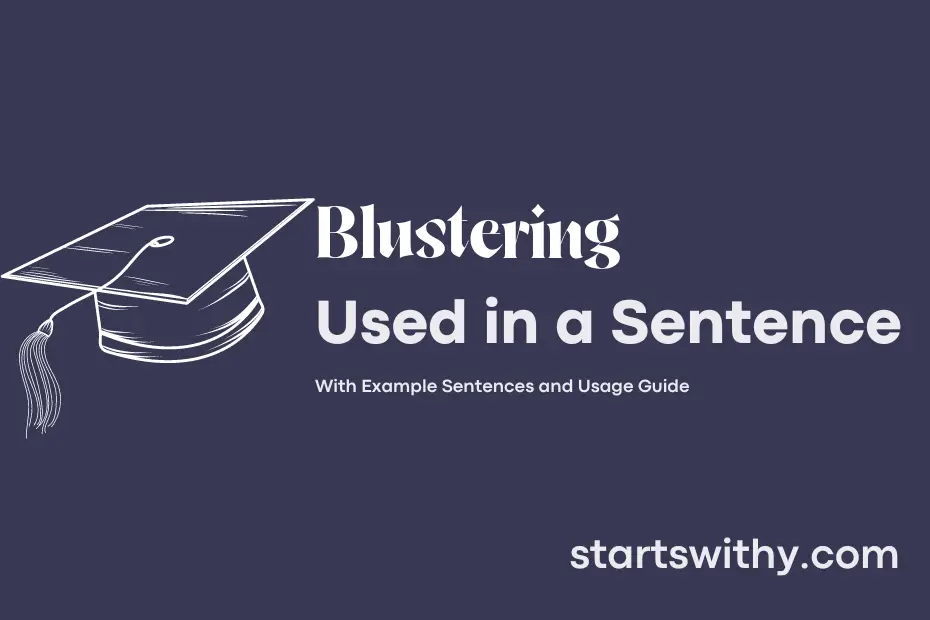Have you ever encountered a blustering individual in a heated argument or debate? When someone is blustering, they are speaking or acting in a loud, aggressive, or confident way, often without much substance to back up their claims.
In conversations or confrontations, a person who is blustering may rely on volume and intensity to make their point, rather than on facts or logical reasoning. This kind of behavior can sometimes be a method of intimidation or to mask a lack of actual knowledge on the topic at hand.
7 Examples Of Blustering Used In a Sentence For Kids
- The wind was blustering outside my window.
- The trees were swaying in the blustering wind.
- I could hear the blustering sound of the leaves rustling.
- The clouds were moving quickly in the blustering sky.
- I felt cold in the blustering weather.
- The kite flew high in the blustering wind.
- I saw a strong blustering storm approaching.
14 Sentences with Blustering Examples
- Blustering through a presentation without proper preparation will only lead to embarrassment.
- It’s important to remain calm and composed during job interviews, rather than blustering through answers.
- Some students tend to resort to blustering when they feel unprepared for exams.
- Blustering about your achievements is not as effective as showcasing them through your work.
- Professors can easily see through blustering attempts to cover up lack of understanding in a subject.
- Group discussions require thoughtful contributions, not just blustering to dominate the conversation.
- Blustering during debates may impress initially, but substance and clarity ultimately win the argument.
- Collaboration and cooperation are more beneficial in group projects than blustering to assert dominance.
- It’s better to ask for help and seek guidance rather than blustering your way through challenges.
- Using blustering language in academic writing does not enhance the credibility of a paper.
- Blustering in a disagreement may escalate tension and hinder conflict resolution.
- Effective communication skills involve listening as much as avoiding blustering in conversations.
- Blustering to cover up a mistake only delays the opportunity for growth and improvement.
- Instead of blustering about the difficulty of a task, it’s better to break it down into manageable steps and tackle it systematically.
How To Use Blustering in Sentences?
To Blustering is to speak or act in a loud, aggressive, or boastful way. When using the word Blustering in a sentence, consider the following tips:
- Start by thinking of a situation where someone is being overly loud or forceful in their speech or actions. This can be used to describe someone who is trying to impress others, intimidate someone, or cover up their own insecurities.
- Once you have a clear image in your mind, try to incorporate the word Blustering into your sentence. For example, “He was blustering about his accomplishments at the meeting, but everyone could see through his facade.”
- Remember that Blustering is typically used in a negative context to convey a sense of exaggeration or insincerity in someone’s behavior. It is often associated with bravado or a lack of substance behind their claims.
- Pay attention to the tone of your sentence when using the word Blustering. It should convey a sense of skepticism or disdain towards the person’s behavior.
- Practice using the word Blustering in different contexts to become more comfortable with incorporating it into your everyday vocabulary.
By following these tips, you’ll be able to effectively use the word Blustering in a sentence and convey the intended meaning to your audience.
Conclusion
In conclusion, the sentences with ‘blustering’ highlight a variety of contexts where the term is used to describe boastful or intimidating behavior. These examples range from describing a person’s blustering attitude to situations where blustering winds or weather conditions are mentioned. Through these sentences, we can understand the versatile nature of ‘blustering’ as a descriptor for both human behavior and environmental elements.
The use of ‘blustering’ in different sentences serves to emphasize the prominence of this term in communication, showcasing its ability to vividly paint scenarios where exaggerated bravado or forceful winds are at play. Overall, the sentences with ‘blustering’ offer insight into the multifaceted ways in which language can capture and convey the essence of blusterous actions and surroundings.



